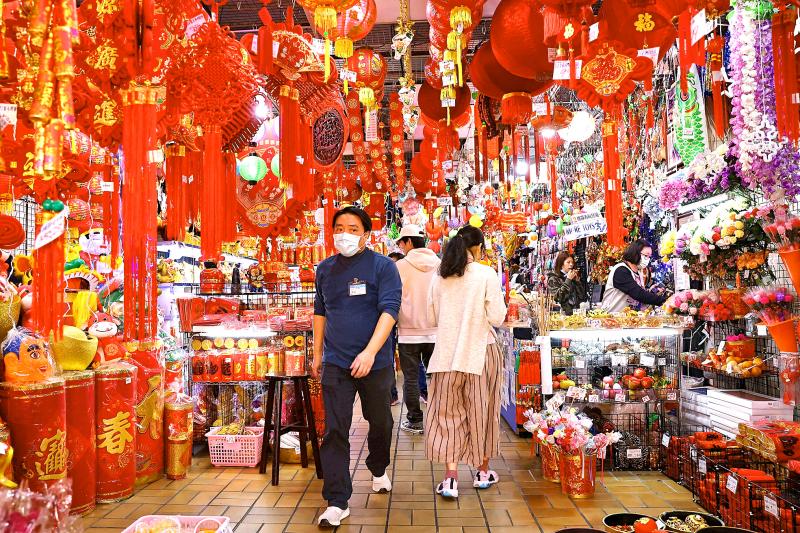The Taiwan Institute of Economic Research (TIER, 台灣經濟研究院) yesterday raised its forecast for the nation’s GDP growth this year from 4.01 percent to 4.3 percent, as private investment could grow after top technology firms announced aggressive capital spending plans.
The increase of 0.29 percentage points came after Taiwan Semiconductor Manufacturing Co (TSMC, 台積電) on Jan. 14 unveiled a capital spending plan of US$25 billion to US$28 billion for this year, which is much higher than market expectations and would drive companies in its supply chain to follow suit, TIER president Chang Chien-yi (張建一) told a news conference in Taipei.
The effect would create robust investment activity that would receive support from government efforts to bolster infrastructure and the ratio of renewable energy sources, Chang said.

Photo: Ann Wang, Reuters
The Taipei-based think tank expects a 4.8 percent increase in private investment, which is 0.19 percentage points higher than its prediction in November last year.
TSMC’s capacity is so tight that Germany, Japan and the US have reportedly asked the government to coordinate with the chipmaker to increase supply, TIER said.
TSMC’s supply constraint is benefiting smaller peer United Microelectronics Co (聯電), which plans to raise prices for the second time after a recent hike, Chang said.
For three consecutive years, local chipmakers have helped the nation grow its fixed capital formation, while main trade rival South Korea has seen the GDP component contract, he said.
Upward price adjustments are extending from chipmakers to chip testers and packagers, TIER research fellow Arisa Liu (劉佩真) said, adding that the trend is favorable for job creation and private consumption.
Private consumption might grow 4.13 percent this year, even though international travel restrictions could persist through the third quarter, TIER said.
A stable economy, pay raises, a positive wealth effect linked to TAIEX rallies and a low comparison base would all lend support to private consumption, Chang said.
The weeklong Lunar New Year holiday next month would also fuel momentum, despite companies canceling year-end gatherings to help limit COVID-19 infection risks, Chang said.
The institute expects exports to expand 4.83 percent and imports to grow 4.87 percent this year, as the world would gradually emerge from the COVID-19 pandemic with the help of vaccines.
Business sentiment for the manufacturing industry was 106.21 last month, up 3.24 points from one month earlier, gaining for the eighth consecutive month, as electronics, machinery and steel makers are upbeat about business, TIER said.
The climate reading shrank 0.02 points to 96.52 for service providers, the institute said, adding that shipping companies and insurers have a positive outlook, while others held flat views.
The sentiment gauge for real-estate sectors fell 0.27 points to 108.96, as developers turned cautious amid renewed credit controls to curb housing price hikes, it found.

RECYCLE: Taiwan would aid manufacturers in refining rare earths from discarded appliances, which would fit the nation’s circular economy goals, minister Kung said Taiwan would work with the US and Japan on a proposed cooperation initiative in response to Beijing’s newly announced rare earth export curbs, Minister of Economic Affairs Kung Ming-hsin (龔明鑫) said yesterday. China last week announced new restrictions requiring companies to obtain export licenses if their products contain more than 0.1 percent of Chinese-origin rare earths by value. US Secretary of the Treasury Scott Bessent on Wednesday responded by saying that Beijing was “unreliable” in its rare earths exports, adding that the US would “neither be commanded, nor controlled” by China, several media outlets reported. Japanese Minister of Finance Katsunobu Kato yesterday also

Jensen Huang (黃仁勳), founder and CEO of US-based artificial intelligence chip designer Nvidia Corp and Taiwan Semiconductor Manufacturing Co (TSMC, 台積電) on Friday celebrated the first Nvidia Blackwell wafer produced on US soil. Huang visited TSMC’s advanced wafer fab in the US state of Arizona and joined the Taiwanese chipmaker’s executives to witness the efforts to “build the infrastructure that powers the world’s AI factories, right here in America,” Nvidia said in a statement. At the event, Huang joined Y.L. Wang (王英郎), vice president of operations at TSMC, in signing their names on the Blackwell wafer to

‘DRAMATIC AND POSITIVE’: AI growth would be better than it previously forecast and would stay robust even if the Chinese market became inaccessible for customers, it said Taiwan Semiconductor Manufacturing Co (TSMC, 台積電) yesterday raised its full-year revenue growth outlook after posting record profit for last quarter, despite growing market concern about an artificial intelligence (AI) bubble. The company said it expects revenue to expand about 35 percent year-on-year, driven mainly by faster-than-expected demand for leading-edge chips for AI applications. The world’s biggest contract chipmaker in July projected that revenue this year would expand about 30 percent in US dollar terms. The company also slightly hiked its capital expenditure for this year to US$40 billion to US$42 billion, compared with US$38 billion to US$42 billion it set previously. “AI demand actually

RARE EARTHS: The call between the US Treasury Secretary and his Chinese counterpart came as Washington sought to rally G7 partners in response to China’s export controls China and the US on Saturday agreed to conduct another round of trade negotiations in the coming week, as the world’s two biggest economies seek to avoid another damaging tit-for-tat tariff battle. Beijing last week announced sweeping controls on the critical rare earths industry, prompting US President Donald Trump to threaten 100 percent tariffs on imports from China in retaliation. Trump had also threatened to cancel his expected meeting with Chinese President Xi Jinping (習近平) in South Korea later this month on the sidelines of the APEC summit. In the latest indication of efforts to resolve their dispute, Chinese state media reported that